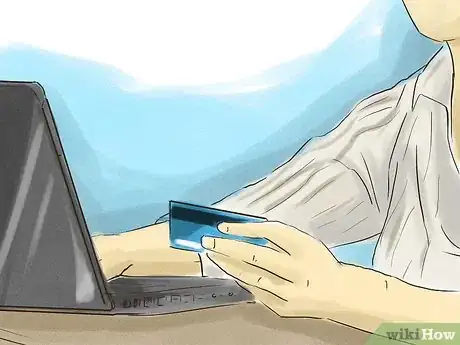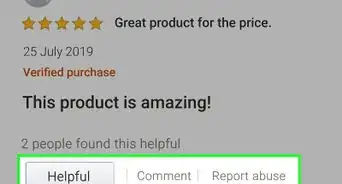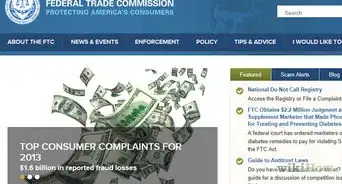This article was co-authored by Clinton M. Sandvick, JD, PhD. Clinton M. Sandvick worked as a civil litigator in California for over 7 years. He received his JD from the University of Wisconsin-Madison in 1998 and his PhD in American History from the University of Oregon in 2013.
There are 13 references cited in this article, which can be found at the bottom of the page.
This article has been viewed 87,460 times.
In the United States, both federal and state laws have been passed to protect consumers from unfair or fraudulent business practices. These laws provide a way for individuals to fight back. However, the best way to ensure that your consumer rights are not violated is to know your rights, be a savvy and cautious purchaser, and to take action against businesses and individuals that engage in scams, fraud, identity theft or other unfair practices.
Steps
Shopping Smartly to Minimize the Risk of Consumer Rights Violations
-
1Learn your basic consumer rights. Congress and state legislatures have passed numerous laws to protect consumer’s rights in the United States. Underlying these laws are the basic rights to which all consumers are entitled. These rights include:
- The right to choose from a selection of quality products and services that are sold at competitive prices.
- The right to safety or that products purchased in the marketplace and used as directed will not harm the consumer.
- The right to information about products so that consumers can make informed choices when purchasing goods.
- The right to be heard by manufacturers of products as well as by government agencies and courts when raising a complaint.
- The right to a remedy or redress when a consumer is dissatisfied with or injured because of a product or service.
- The right to environmental health, which means that manufacturers and marketplaces cannot operate their businesses in a way that damages the environment.
- The right to service that is convenient and respectful.
- The right to education about consumer rights and training to facilitate thoughtful and informed decisions in the marketplace.[1]
-
2Evaluate large or risky purchases before making them. Before making a large or risky purchase, you should consider checking with other retailers to make sure that the item is not less expensive elsewhere. In addition, you should discuss your potential purchase with a trusted friend or family member who has made a similar purchase. You may also consider:
- Making a budget to determine whether you can afford the item.
- Deciding what features or services are absolutely necessary and what are unnecessary but costly.
- Reading reviews online about the product and determining whether the product has been recalled. You can check on recalled products at: https://www.recalls.gov.[2]
Advertisement -
3Ask about product warranties. A warranty is a promise by a seller or manufacturer that they will repair or replace a product if it breaks down within a certain amount of time. Federal law requires that warranties must be available for consumers to review before purchasing a product. When reviewing a warranty or comparing warranties between manufacturers, you should look for the following:
- Check to see how long the warranty lasts and if anything voids your coverage.
- Who provides warranty service – is it the manufacturer or someone else?
- Does the company repair or replace the product if it stops working?
- What repairs or problems are covered?
- Ask that any warranties made orally by a salesperson be put in writing or you may not be able to get the promised service.[3]
-
4Check that professionals are licensed. Before contracting with someone for professional services such as lawyers, contractors, plumbers or others, you should make sure that they are appropriately licensed before hiring them.
- Contractors, plumbers and electricians are all required to be licensed by state boards. You can request a service provider’s license number and then check his or her licensure status online. You can find links to state license boards at: http://www.contractors-license.org.
- You check whether lawyers or doctors are licensed through state bar associations or medical associations.
-
5Check business reviews at the Better Business Bureau. The Better Business Bureau (BBB) maintains a list of complaints and ratings for companies. Before hiring a business to provide services, you should review BBB’s website to make sure the company has not mistreated consumers in the past.
- You can lookup companies on BBB at: https://www.bbb.org.
-
6Be careful making online purchases. When making purchases online, only provide your contact information and credit card companies at trusted websites.[4]
- When making online purchases, you should look for a small padlock symbol in your address bar. This indicates that the website is secure.
- Website addresses that begin with “https” versus “http” offer a greater level of security.
- If you are unsure whether the site is trustworthy, conduct an internet search on the name of the company or website and the words “trustworthy” or “secure.” This may help you uncover any problems people had with the website or reviews that the website is secure.
-
7Always request a receipt for purchases. You should always request and keep the receipt for any product or merchandise that you purchase. A receipt is usually required to return faulty merchandise or submit a complaint against a business. You should also keep other important documents related to the purchase of goods or services, such as, contracts, warranties and manuals.[5]
-
8Read and submit a warranty after purchase. It is important to comply with the warranty and care instructions of a product. Some warranties will be voided if you use the product in manner that was not specified. Additionally, some manufacturers require that you register your product and/or warranty with them, either online or by returning a warranty card.[6]
Protecting Against Consumer Rights Violations in Purchases
-
1Challenge fees charged by gift cards. Occasionally, gift card companies may try to charge you a fee for failing to use your card within a year. Federal law prohibits these types of charges. You cannot be charged an inactivity fee until after you have not used the card for a year and the card cannot expire for at least five years.
- You should also check your state laws regarding gift card fees and expiration dates as some states have banned these practices.[7]
- You can review state and federal law regarding gift cards at: http://www.ncsl.org/research/financial-services-and-commerce/gift-cards-and-certificates-statutes-and-legis.aspx
-
2Use a credit card when making online purchases. People are increasingly making large purchases over the internet. There are a number of things you can do to protect against fraud and consumer rights violations. One of the most important things that you should do is use a credit card when making online purchases. Credit card companies are responsible for fraudulent purchases over $50, whereas a debit card does not offer the same protection.[8]
- Before making an online purchase, you should read the website’s security policy and how it handles disputed charges.
- Some websites, such as eBay, offer customers a money back guarantee is a seller is unable to resolve an issue with your transaction.[9]
- Whenever an Amazon account holder goes to purchase an item, the website automatically shift the person’s account to an encrypted server to protect his or her payment information.[10]
- Amazon also allows you to dispute any unauthorized charges through Amazon directly with the company.[11]
-
3Use the “cooling-off” rule. If you make a purchase that you regret or felt pressured into, under federal law consumers have the right to cancel the purchase by midnight of the 3rd business day after the sale.
- Your purchase must be for $25 or more in order for the cooling off rule to apply.[12]
-
4Ask a retailer to explain their return policy. While federal and state laws place requirements on retailers regarding refunds, one of the best ways to protect your consumer rights is to ask a retailer to explain their return and refund policy before you make a purchase. It is more likely that a large retail operation will have posted their refund policies, however smaller retail operations or individuals may not.[13]
- In addition to asking a retailer to explain their policy, you should review your state’s laws regarding refunds. You can find a summary of state refund laws at: http://consumer.findlaw.com/consumer-transactions/customer-returns-and-refund-laws-by-state.html.
Responding to Consumer Rights Violations
-
1Use your right to complain. Despite taking precautions, you may still experience a violation of your consumer rights. If you experienced problems with an item or service that your purchased, you have the right to complain. If you are not satisfied with the retailer’s response, you have the right to file a formal complaint against the business. Just as you have consumer rights, you also have an obligation to speak up when your rights are violated and express your concerns.[14]
-
2Contact the seller or manufacturer if a product is defective. If a purchased product is defective, your first step should be to contact the seller or manufacturer of the product. If you call the manufacturer, ask to speak to the customer service department and explain the problem with the product. Most companies want to maintain good customer relations so often they will work with you to repair or replace the product.
- Normally, the product needs to be defective and your claim must be maid within the timeframe of the warranty.
- Some companies will replace a defective product outside of the warranty because they want to maintain positive customer relations.
- Some sellers may require proof of purchase before repairing or replacing defective goods.
- If customer service is not providing satisfactory assistance, you should ask for the name of the person’s supervisor or manager and an address where you can send a letter.[15]
-
3Contact a supervisor in writing. If after speaking with customer service, the seller or manufacturer did not resolve your issue, you should write a letter to a supervisor in the company. You can always ask a customer service representative to whom you should address your concerns. In your letter, your should address the following:
- When you purchased the product or service, the amount that you paid and attach copies of any invoices or receipts that you have.
- A detailed description of the problem with the product or service and why it failed to meet your expectations.
- A statement of how you want the situations resolved, either by refund, replacement or repair.
- If your letter does not get a response, send a copy of the letter to the business’s national headquarters or someone higher in the management chain. If this is a small retailer, there may not be anyone else to whom you can complain and therefore you should make your complaint to consumer protection offices and organizations.
- You can review a sample complaint letter at: https://www.usa.gov/consumer-complaints.[16]
-
4Write an online review of the company. If you received poor service or a defective product and an unsatisfactory response from the retailer, you can write a negative review about the retailer online. Many online retailers such as Ebay and Amazon and websites such as Yelp allow you to post negative as well as positive reviews about products and services. By posting an online review, a retailer may respond to your concerns more quickly. If not, you have at least warned other consumers about the issues you faced.
-
5File a complaint with the Better Business Bureau (BBB). BBB allows consumers to file complaints about businesses for poor services and products. BBB collects information about the nature of the transaction, the product and the consumer’s complaints. BBB then forwards your complaint to the business within two business days. They ask each business to respond within 14 days and try to resolve consumer complaints within 30 days.
- You can file a complaint with BBB at: https://www.bbb.org/consumer-complaints/file-a-complaint/get-started.[17]
-
6File a complaint with a federal or state consumer protection agency. Every state has a consumer protection agency dedicated to protecting consumer rights and addressing consumer complaints. While each agency may have its own requirements, generally you will be asked to provide the following information:
- Name and contact information.
- Information about the seller and the type of product or service.
- A detailed description of your complaint.[18]
- You can find contact information for state consumer protection agencies at: https://www.usa.gov/state-consumer.
- At the federal level, the Federal Trade Commission (FTC) is responsible for protecting consumer rights. The FTC accepts complaints under several broad categories: identity theft; scams and rip-offs; unwanted telemarketing, text, or SPAM; mobile devices or telephones; internet services, online shopping, or computers; education, jobs, and making money; and credit and debt.
- You can make a complaint to the FTC online at: https://www.ftccomplaintassistant.gov/#&panel1-1
-
7Engage in dispute resolution. Some contracts for services or purchase may require that a consumer and retailer engage in dispute resolution rather than filing a lawsuit. Dispute resolution may include the following:
- Mediation, which is when both sides meet with a neutral third party who helps facilitate an agreement or settlement between the parties. In mediation, the parties attempt to reach an agreement with the assistance and guidance of a mediator. The mediator does not have the power to require the parties to take any actions.
- In an arbitration, the arbitrator acts like a judge and decides how the dispute should be resolved.[19]
References
- ↑ http://www.aces.edu/pubs/docs/U/UNP-0040/UNP-0040.pdf
- ↑ https://www.usa.gov/before-you-shop
- ↑ http://www.consumer.ftc.gov/articles/0252-warranties
- ↑ https://www.usa.gov/before-you-shop
- ↑ https://www.usa.gov/before-you-shop
- ↑ https://www.usa.gov/before-you-shop
- ↑ http://consumer.findlaw.com/consumer-transactions.html
- ↑ http://consumer.findlaw.com/consumer-transactions/paying-online-for-goods.html
- ↑ http://pages.ebay.com/help/buy/safe-trading.html
- ↑ https://payments.amazon.com/help/5969
- ↑ https://payments.amazon.com/help/5970
- ↑ http://consumer.findlaw.com/consumer-transactions/customer-returns-and-refund-laws-by-state.html
- ↑ http://consumer.findlaw.com/consumer-transactions/customer-returns-and-refund-laws-by-state.html
- ↑ https://www.usa.gov/consumer-complaints; http://www.aces.edu/pubs/docs/U/UNP-0040/UNP-0040.pdf
- ↑ http://consumer.findlaw.com/consumer-transactions.html
- ↑ https://www.usa.gov/consumer-complaints
- ↑ https://www.bbb.org/consumer-complaints/file-a-complaint/get-started
- ↑ http://www.ago.state.al.us/Page-Consumer-Protection-File-a-Complaint-01
- ↑ https://www.usa.gov/consumer-complaints
About This Article
You can protect your consumer rights by shopping wisely and getting help if you’re dissatisfied with a product or service. By shopping smartly, you'll minimize the risk of having your consumer rights violated. For example, whenever you’re paying for services, like lawyers, contractors, or plumbers, check their professional licenses to make sure they’re legally covered. Always ask for a receipt so you have physical proof of your purchase. To protect your consumer rights, always use a credit card for any large purchases, since your bank will cover you in the event of a fraudulent transaction, while this doesn't apply to debit cards. If you make a purchase for over 20 dollars that you regret or felt pressured into, under federal law you have the right to cancel the purchase by midnight of the 3rd business day after the sale. Don't panic if your consumer rights are violated, since the law will support you. If a product is defective, you also have the right to a replacement or refund, although you may need proof of your purchase, like a receipt or invoice. For more tips from our Legal co-author, including how to report a company for breaking consumer law, read on!

















-Step-1.webp)



























































